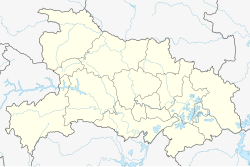Changyang County
长阳县 | |
|---|---|
| 长阳土家族自治县 Changyang Tujia Autonomous County | |
 Longzhou Boulevard | |
| Coordinates: 30°28′N 110°52′E / 30.467°N 110.867°E | |
| Country | People's Republic of China |
| Province | Hubei |
| Prefecture-level city | Yichang |
| Area | |
• Total | 3,430 km2 (1,320 sq mi) |
| Population (2020)[1] | |
• Total | 305,740 |
| • Density | 89/km2 (230/sq mi) |
| Time zone | UTC+8 (China Standard) |
| Website | changyang |
Changyang Tujia Autonomous County (simplified Chinese: 长阳土家族自治县; traditional Chinese: 長陽土家族自治縣; pinyin: Chángyáng Tǔjiāzú Zìzhìxiàn) or in Tujia language known as Changryangf Bifzivkar Zivzirxianf is an autonomous county in western Hubei province, People's Republic of China. It is under the administration of the prefecture-level city of Yichang.
The county is located in the basin of the Qing River, a right tributary of the Yangtze. The river is flanked by mountains on both sides, the tallest of which - the Tianzhu Mountain - is 2,542 metres (8,340 ft) tall. The river is dammed by the Geheyan Dam (located within the county) and the Gaoba Dam (located in the neighboring Yidu County-level City, but flooding some of the Qingjiang River valley within Changyang County as well). The resulting reservoirs provide the main water transportation route throughout much of the county.
Established in 1984 with a surface area of 3,412 square kilometres (1,317 sq mi) and a population in 1984 of 399,000 inhabitants, of which 295,000 were Tujia.[2]
- ^ a b Cite error: The named reference
xzqhcywas invoked but never defined (see the help page). - ^ "Autonomous Administration of the Tujia".
